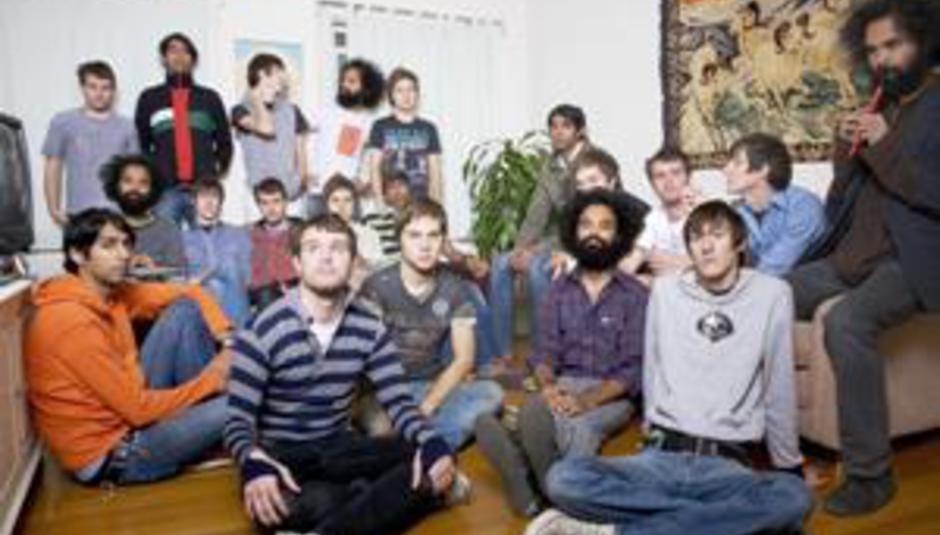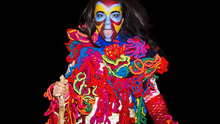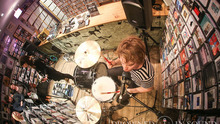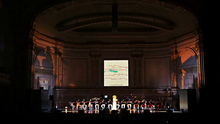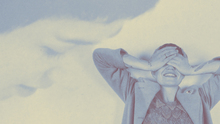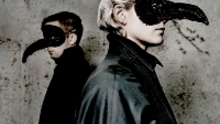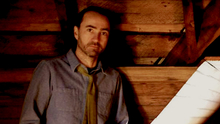DiS meets Seattle's most-visceral and forward-thinking punks on the block, The Blood Brothers, during their DiS.com-sponsored tour of the UK
Mark Gajadhar spent last night watching three hours of American Idol. He was supposed to be drumming at Nottingham’s Rock City venue. Only the poor health of bandmate Johnny Whitney – one of the group’s twin vocalists – prevented him from doing so. He doesn’t seem all that upset, on the surface. After all, the cancelled show allowed him to touch base with home: the auditions broadcast came not-so-live from his hometown of Seattle.
“A friend of mine was on it, beat-boxing ‘Crazy’ by Seal. But Simon said that the auditions in Seattle were the worst he’d ever seen.”
Across the small, but not cramped, dressing room, Jordan Blilie meets Gajadhar’s gaze. “Really? Wow. Go Seattle.”
There are a few giggles – Morgan Henderson’s ample beard rustles as he exhales with a slight chuckle – and then thoughts turn to the present promotional duty. A little red light blinks into life on a recorder and the three members of The Blood Brothers assembled around DiS forget all about televised talent shows and concentrate on what awaits them in only a few hours: a sold-out London show with a singer hardly in the best of health.
“He’s barely slept since we arrived,” says Blilie of his co-vocalist’s condition. “He’s had a really bad throat.” Later this will be apparent: Whitney’s traditional yelps and barks and squeals are flattened, rather, by a niggling sensation in his neck. The remaining members – Henderson plays bass while guitar riffs are the preserve responsibility of Cody Votolato – make it another night to remember, though; another night of punk-rock colliding head on with circus big top thrills and break-neck breakdowns delivered with eye-popping intensity. The pit directly in front of the stage is where the hardcore sing-along fans gather; around the sides, attendees in expensive threads, looking for all the world like they’ve stepped straight out of an ‘alternative clothing’ catalogue, thrust digital camera lenses stage-wards. Their fringes can’t quite obscure their youth. Surely there are newcomers to The Blood Brothers in this densely-populated room above a shopping centre?
“I don’t feel that our audience is getting younger,” says Henderson, “I just think that we’re getting older.”
“Yeah, I feel that we’ve always played for 17- and 18-year-olds,” says Blilie, legs crossed and beer bottle gripped loosely between two spindly fingers. “We just happened to be 17 and 18 at some point. I’m gonna be 26 later this year, and I’m still in the band! I mean, we don’t write songs for 15, 16, 17 year olds, but I think that largely, y’know, you get that age group coming to shows. Partially because older people, I think, tend to get to a point in their life where they don’t want to go to an all-ages show. They want to sit in a bar and have a conversation, maybe have a couple of drinks with their friends, and watch some music.”
I’m almost 27. I’m here. I’m unlikely to talk over the top of the band.
“Yeah, and I’m 28,” replies Henderson. “I still know people – people who are older than me – who are attracted to shows like ours. People who went to see Led Zeppelin: they didn’t go to talk over the top of the band.”
"To really see a swell of new faces you’d have to be played on the television or the radio, which doesn’t seem to happen for us."
---
Neither Henderson nor Blilie see the night’s sold-out show as being a sign of a sudden growth spurt, profile-wise.
“I don’t think there’s ever been a considerable jump between Crimes and Young Machetes, or between Burn Piano Island, Burn and Crimes,” explains Blilie. “It seems that the people who have the last two records are well informed of us from Burn.... At the point the band is at right now, to really see a swell of new faces you’d have to be played on the television or the radio, which doesn’t seem to happen for us.”
So do you not receive much coverage on either platform in the US?
“We get played on college radio.”
Is that not enough to maintain a band’s career? I was under the impression that US college radio was quite influential.
Henderson interjects: “It’s not big enough for a career. When you have college radio stations, there are fewer labels influencing what’s going to be played. It’s less controllable.”
Which sounds like a good thing, to an uneducated outsider anyway. But the importance of radio and television in the success of a modern-day rock band has dwindled in recent years, as the internet’s increased availability – both in terms of coverage and cost – has enabled up-and-coming acts to get their music into households on the opposite side of the world.
Blilie: “It’s, like, we make a video, right? We spend a certain amount of money, and a certain amount of our time, making something that we’re pleased with. We know it’ll get played maybe five times on your major video networks, but that it could be viewed a hundred thousand times on the internet. People can just find it: the information’s there and it’s accessible for free.”
Henderson: “Which is great for bands like us, who give a video in and get told: ‘Change this, this and this’. So then we’re in a position where we can decide what to change, or not, and if we don’t there’s a chance it won’t get played. But, because now there’s YouTube and MySpace, people can find it as we put it up. It’s great that we can put our stuff out there as we want it, and that it’s free.”
Currently, there are two videos in online circulation from the band’s latest long-player, the nine-out-of-ten Young Machetes (review): ‘Laser Life’ (link) and the promo for the recently released single ‘Set Fire To The Face On Fire’ (link). Although not glossy affairs in the grand scheme of MTV things, the clips are nevertheless representative of the stage The Blood Brothers have reached: they’re a professional band. This is their job as well as their hobby, their social life as well as their daily grind. Almost.
Are you able to switch off from the band during your downtime?
Blilie laughs: “I sit at home and I think about The Blood Brothers. The band’s always in the back of my mind because there are always decisions that need to be made, and there’s always something that’s being set up, so it never turns off completely. But we each pursue our own individual interests when we have time off, of course. I can’t imagine being so focused on one thing all the time.”
In the time between the Crimes LP and its follow-up of last year – that said, Young Machetes was only officially released in the UK on January 22, 2007 – four of the five brothers embarked on side projects: Blilie and Votolato got together with Nick Zinner of Yeah Yeah Yeahs and The Locust’s Justin Pearson and Gabe Serbian to form the thrash-punk Head Wound City (a self-titled EP is available through Three One G), while Whitney and Gajadhar formed Neon Blonde, whose Chandeliers In The Savannah album of 2005 received the DiS seal of approval here.
“In me and Cody’s case, doing the band that we did, it wasn’t something that we were yearning to get out,” explains Blilie. “It was just fun – it was friends getting together, and we spent a week on it in total. I think in Johnny’s case there were things he needed to flush out, or things that he couldn’t bring into the practise space with us. For him, doing his own stuff with Mark aided him a lot more, and I feel safe in saying he’d agree with that.”
Henderson also has a host of non-BBs-related projects on and off the go: “I did a remix for Minus The Bear, and I have other musical things that I do for some modern dance pieces. We all have our alternative outlets.” But, after ten years as a unit, the quintet’s collective focus remains firmly on the development of The Blood Brothers.
"I feel like I’m doing a job when I’m getting my picture taken in an alley, and someone’s telling me to look ‘more serious’. That’s the stuff where you ask yourself: what am I doing here?"
---
“We were 15, 16 years old when we started, and we just wanted to do something that sounded like Area 51 and Death Wish Kids,” says Blilie. “That was sort of our motivation – we started our band as a fun side-project that we didn’t take too seriously, and we never really set any goals. I don’t think that we set them in the present day, apart from getting a group of songs done and recording and then touring. Obviously there are things that have developed over the years, and we’ve settled into certain roles.”
Henderson: “Aspects of it have become something of a job.”
Blilie: “I feel like I’m doing a job when I’m getting my picture taken in an alley, and someone’s telling me to look ‘more serious’. That’s the stuff where you ask yourself: what am I doing here?”
And why’s the band stayed together from such a young age, when so many teenagers lose friends as they get older, let alone bandmates?
Blilie: “I think it’s probably a mutual excitement for change and new ideas. There’s never one, or a couple of stalwarts, who wants to rehash what we’ve considered successful in the past. That, and maybe we communicate better than most bands. I think that part of it is that we love one another’s company – it feels good, and natural, when we’re together. There’s a certain chemistry that we’ve built over the last ten years that’s very special.”
Would you say you’re all on the same page when it comes to writing new material?
Henderson: “It’s, to me, a case of five separate pages – in some ways they conflict and in some ways they gel – and it’s where all those things meet. There’s not one mind dictating where things go. Johnny might write a song like this, but it might not be the sort of song I’d write. It’s not like that, creatively, but so far as how we stay together Jordan’s right: for me, when we come back together, at the airport, it’s ten years of back history and relating to each other, and everything clicks back into place. It’s that, and humour plays a big part in what makes us go. Like any band we have arguments, but those things are private. Luckily we’re not like these headline-grabbing bands, there [in the press] because so and so did this or that. And also there are people that do drink and smoke weed in the band, but nobody is a heavy drug user and we’re all fairly responsible, and I think that with your average rock band people aren’t like that. That’s probably how a lot of bands break up: you can’t communicate when you’re that fucked up.”
Communication is, of course, key in the enjoyment of The Blood Brothers’ twist on far-from-derivative hardcore music: allow yourself to become soaked in the surreal lyricism of Whitney and Blilie and suddenly the clatter-crash nature of the music about the chattering pair isn't their sole USP. Those that don’t speak their language, though, are often nonplussed as to the quintet’s appeal. Certain critics found Young Machetes to be short on inspiration; the cynical might suggest that said reviewers barely gave the record a chance, given the progression evident from Crimes.
Blilie: “I think it’s been received how any of our other records were received. In the States, we get sent stuff from our publicist, and it seemed to walk the same line as everything else: people either really responded to it positively, or people hated it. That seems to be the case with most of the stuff we make, actually.”
"People like to make their own assumptions about the motivation behind our decisions. Like, okay, there’s more singing: obviously they’re trying to tap into a mainstream market, or they’re trying to make a pop record."
---
Do you think that some people approach the band from the wrong angle, assuming The Blood Brothers are a one-dimensional noise band? Certainly Rolling Stone referred to you as a ‘noise band’…
Henderson: “Even if it’s a new publication and they don’t read up on us – and we do understand that people only have so much time to do their job – you can do a little bit of reading and save yourself an irritated answer from us. If you take into account where we came from and where we are now, pretty much like what you were saying, we’re not going to be a one-dimensional screamy band. I don’t think we were that when we started, but if we were, where’s your challenge? Your challenge becomes melody, and harmony, and arrangement. And those are the things we’re trying.”
And this development, into more hook-laden territories, has been regarded as a regressive step in some circles.
Blilie: “But I also think back to (first album) This Adultery Is Ripe, and there were hooks on that record. The title track’s a very upbeat, accessible, hooky punk song. On Burn…, which was so all over the place, there are still parts you can sing along to, and a solid core to each song that I think wrangles in all the ideas. I think that, maybe, people like to make their own assumptions about the motivation behind decisions that a band makes, and lots of times those assumptions can be very clichéd and very tired. Like, okay, there’s more singing: obviously they’re trying to tap into a mainstream market, or they’re trying to make a pop record. To me that’s very lazy… I dunno. It’s a lazy assumption to make.”
Henderson: “There’s always a progression, and there’s hardly ever been that big of a jump to any of our moves, so far as we see them. It’s an interesting idea to me that hard and fast means disturbing to some people, and that the band is pushing the boundaries. Because of where we’re from, the instrumental sections are the challenge for us. We’re typically impatient with how long we play a part for – compared to any other band, it’s never very long. It’s interesting that on this album we’ve got a chunk of instrumental, which is something we’ve never had before. It’s super-mellow, not noisy nor aggressive. It’s just this thing that happened in the studio: Cody had a riff that he always wanted to try, and I played upright bass and Mark came in with some turntable stuff that he wanted to try. So it was an experiment. It was definitely not in my mind to have instrumental sections before now, at all.”
So do you now see that you’ve outgrown your roots – you’ve surpassed the acts that inspired you both in terms of success and acclaim – and that you’re now an act that’s inspiring new bands?
“It’s nice when I get the chance to talk to a kid at a show, and I get the chance to talk to them about bands that they might not have heard of,” says Blilie. “Hopefully they’ll check them out, and have the same experience listening to them that I had when I was young. That’s very satisfying. I like that.”
"Every time we come over here there’s a bunch of bands that someone or other is trying to tout as the next big thing. I remember them trying to push us into these extreme music brackets, like ‘Look at how fucked up they are’.”
---
And what if your present success snowballed into the sort of hype that keeps those bands Morgan mentioned earlier in the press, and you were suddenly bracketed as this hot new band to look out for?
“It’s something that we laugh about,” says Blilie, not actually laughing. “We were talking today about how every time we come over here there’s a bunch of bands that someone or other is trying to tout as the next big thing, and I think we had our turn at that, a little bit, during Burn.... We sort of felt that at the time. I remember them trying to push us into these extreme music brackets, like ‘Look at how fucked up they are’.”
Henderson: “They were just, like, ‘this is all because of Ross’ (Robinson, producer of Burn…), and they pumped us to the kids of Kerrang and it didn’t work. And I think we’re so much better off, because personally I wouldn’t want people to look at our music that quickly. Putting all these bands in such little boxes… I hope that we’re not like that. Jordan pointed out that your music publications are weekly, and that couldn’t happen in the States. People don’t buy magazines like that in the States.
Blilie: “To me, it’s like what really changes that much in a week, in a band’s life. What, he’s parting his hair on the opposite side now? To me it’s a shame to put music into a sensationalised context. We put a lot of time, and energy, and ourselves into the music that we make, from its very infantile conception to finishing artwork… so for it to be blown into this massive proportion, I’m glad that’s never happened to us.”
The Blood Brothers are in the UK right now. Their remaining tour dates, sponsored by DrownedinSound.com, are as follows:
January
25 Cardiff Clwb Ifor Bach
26 Oxford Zodiac
27 London Barfly Xfm all-dayer with Frank Turner and more
Young Machetes is out now through Wichita (UK) and V2 (USA). The Blood Brothers’ MySpace page is right HERE.

